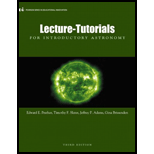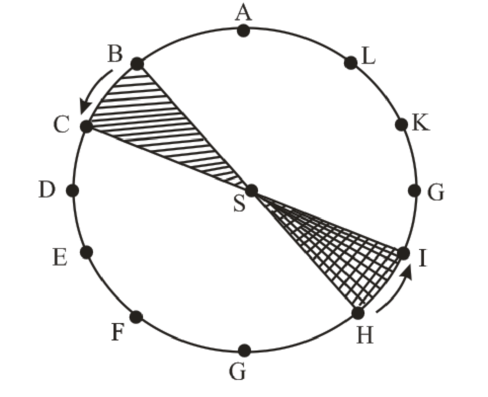
Whether the planet obeys Kepler’s second law or not.
Answer to Problem 1KESP
The planet obeys Kepler’s second law.
Explanation of Solution
Kepler’s second law states that a planet covers an equal amount of area for equal time interval.

From the above figure, it is clear that circular orbit of planet is divided into 12 equal segments. It means that time interval for any two consecutive points is one-twelfth of total time. Also, the area swept by one segment is equal to the area swept by other segment as arc and radius is same.
Each segment swept equal area in equal time interval and hence the planet follows Kepler’s second law.
Conclusion:
Thus, the planet obeys Kepler’s second law.
Want to see more full solutions like this?
Chapter 2 Solutions
Lecture- Tutorials for Introductory Astronomy
Additional Science Textbook Solutions
Conceptual Physics (12th Edition)
Physics for Scientists and Engineers
College Physics
University Physics Volume 2
 College PhysicsPhysicsISBN:9781305952300Author:Raymond A. Serway, Chris VuillePublisher:Cengage Learning
College PhysicsPhysicsISBN:9781305952300Author:Raymond A. Serway, Chris VuillePublisher:Cengage Learning University Physics (14th Edition)PhysicsISBN:9780133969290Author:Hugh D. Young, Roger A. FreedmanPublisher:PEARSON
University Physics (14th Edition)PhysicsISBN:9780133969290Author:Hugh D. Young, Roger A. FreedmanPublisher:PEARSON Introduction To Quantum MechanicsPhysicsISBN:9781107189638Author:Griffiths, David J., Schroeter, Darrell F.Publisher:Cambridge University Press
Introduction To Quantum MechanicsPhysicsISBN:9781107189638Author:Griffiths, David J., Schroeter, Darrell F.Publisher:Cambridge University Press Physics for Scientists and EngineersPhysicsISBN:9781337553278Author:Raymond A. Serway, John W. JewettPublisher:Cengage Learning
Physics for Scientists and EngineersPhysicsISBN:9781337553278Author:Raymond A. Serway, John W. JewettPublisher:Cengage Learning Lecture- Tutorials for Introductory AstronomyPhysicsISBN:9780321820464Author:Edward E. Prather, Tim P. Slater, Jeff P. Adams, Gina BrissendenPublisher:Addison-Wesley
Lecture- Tutorials for Introductory AstronomyPhysicsISBN:9780321820464Author:Edward E. Prather, Tim P. Slater, Jeff P. Adams, Gina BrissendenPublisher:Addison-Wesley College Physics: A Strategic Approach (4th Editio...PhysicsISBN:9780134609034Author:Randall D. Knight (Professor Emeritus), Brian Jones, Stuart FieldPublisher:PEARSON
College Physics: A Strategic Approach (4th Editio...PhysicsISBN:9780134609034Author:Randall D. Knight (Professor Emeritus), Brian Jones, Stuart FieldPublisher:PEARSON





